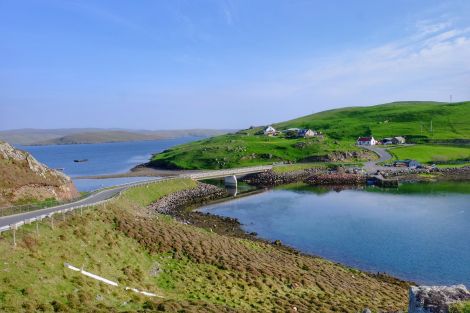Politics / Shetland autonomy gets seal of approval from the greens
A COUNCILLOR who is a long-term advocate of more powers for Shetland has welcomed members of the Scottish Green party voting to support autonomy for the isles.
Duncan Anderson, who represents the North Isles, said it was positive to see a “mainstream political party” supporting Shetland autonomy.
He was commenting after a motion on the topic was presented to Scottish Greens’ annual conference this weekend by Shetland councillor Alex Armitage.
His motion secured 88 per cent backing from party members.
Green councillor Armitage said that decisions made locally tend to be of higher quality and relevance than decisions made hundreds of kilometres away.
Back in 2020 Shetland councillors voted overwhelmingly in favour of exploring options for political and financial self-determination.
While there appears to have been no concrete steps forward, Armitage said he is keen to see remain high on the agenda.
Referring to his view that more decisions should be made locally, he said: “That is why Greens support Scottish Independence, and that is why Greens should support Shetlanders if we want to have more power to make decisions that affect us”.
The motion agreed to support the Shetland Islands to achieve a level of political and economic autonomy, as directed by the democratic will of the people of Shetland, up to and including the level of autonomy held by the Faroe Islands from Denmark.
Armitage, however, suggested that a Faroese model was unrealistic in the short term.
“In the first instance, I would advocate using the powers that we have under the Islands Act to request more powers to be devolved locally.
“Ideas about joining Norway or unilaterally declaring independence strike me as fairly grandiose – certainly in the short term.
Become a member of Shetland News
“Faroese society has thrived since folk there have taken more powers into local hands. To me it makes total sense to take an active interest in how this has taken place, and look into how we might replicate that in Shetland.”
Autonomy supporter Councillor Duncan Anderson welcomed the backing from the Greens.
However, he said the reputation of the party in Shetland had taken a dent after its part in the Scottish Government’s controversial highly protected marine areas proposal.
“As someone who holds a long standing belief in autonomy for Shetland, I am obviously delighted to see such a motion being passed by a mainstream political party such as the Greens,” Anderson.
“I give full credit to my colleague Cllr Armitage for bringing this motion to his party.
“The Greens’ credibility in Shetland took a nosedive with the currently shelved HPMA debacle so it is good to see a different approach from them, seemingly supporting decentralisation this time.
“Hopefully more and more people will come around to the idea that autonomy is the only way to safeguard the future of our fragile community.”
Earlier this year Orkney Islands Council hit the headlines after elected members backed calls to look into alternative models of governance.
Shetland’s 2020 motion stemmed from growing frustration over centralised decision making and reduced government funding for essential services.
It was not the first foray into the concept of more powers for the isles, with the Shetland Movement gaining popularity in the 1980s and 1990s before losing steam.
In 2015 autonomy group Wir Shetland was formed but it remains inactive.
Self-governing Faroe, to the north west of Shetland, has often been used as an example of how things could be run.
Although part of Denmark, Faroe – with a population of nearly 50,000 – has control over areas like energy, environment, taxation, trade and education, as well as the management of fisheries and “all other utilisation of natural resources”.
The Faroe Islands have their own democratically elected assembly, and a government headed by a prime minister, while they also have two representatives in the Danish parliament.
The Danish Government, meanwhile, grants an annual subsidy to Faroe.
Become a member of Shetland News
Shetland News is asking its many readers to consider paying for membership to get additional features and services: -
- Remove non-local ads;
- Bookmark posts to read later;
- Exclusive curated weekly newsletter;
- Hide membership messages;
- Comments open for discussion.
If you appreciate what we do and feel strongly about impartial local journalism, then please become a member of Shetland News by either making a single payment, or setting up a monthly, quarterly or yearly subscription.












































































